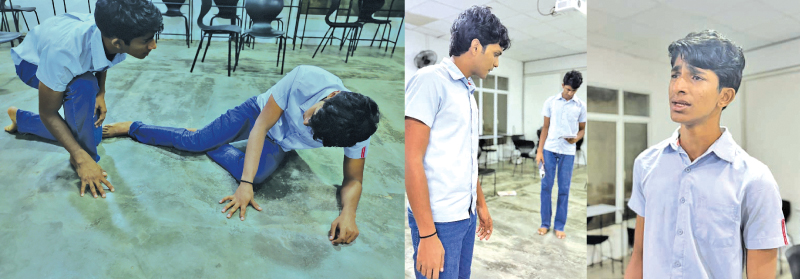 The play highlights how people justify personal gain at the expense of others’ lives, a reality that isn’t exclusive to any one country. The aftermath would obviously be disillusionment, fractured families, and a cynical society that has lost its empathy
The play highlights how people justify personal gain at the expense of others’ lives, a reality that isn’t exclusive to any one country. The aftermath would obviously be disillusionment, fractured families, and a cynical society that has lost its empathy
Observer Muse recently caught up with Tasmin Anthonisz, the director behind Elizabeth Moir School’s upcoming production of Arthur Miller’s classic, “All My Sons” that will be staged on February 21 and 22 at the Lionel Wendt Theatre.
We discussed what makes this play connect with the Sri Lankan audience, and here’s a peek into our conversation.
Q : How have you adapted the themes and context of Arthur Miller’s play to resonate with a Sri Lankan audience?
A: I haven’t actually. All My Sons is one of those plays that is timeless and universal. The story and its implications naturally resonate with any audience in touch with the present, not just in terms of our history but the current state of the world.
Q: What visual elements or staging choices are you incorporating to reflect Sri Lankan culture?
A: Well, the architecture is more Sri Lankan than American 1950s suburb! We’ve opted for a more open-plan setting. The atmosphere draws on the cosmic spiritual element within the play, which I guess is more in tune with our local vibes.
Q: In what ways do the themes of loss and war profiteering reflect contemporary issues faced in Sri Lanka?
A: These themes are cyclical. A lot of the tension comes from our human need to feel and be acknowledged while juggling social graces and personal ambitions. The play highlights how people justify personal gain at the expense of others’ lives, a reality that isn’t exclusive to any one country. The aftermath would obviously be disillusionment, fractured families, and a cynical society that has lost its empathy.
Q: How do you plan to engage audiences in Sri Lanka with the moral dilemmas presented in the play?
A: With genuine, honest acting! These dilemmas mirror real-life emotional and psychological impacts. The average theatre-goer will likely see themselves, or someone they know, in the characters. We’re not here to spoon-feed messages; it’s about giving students a chance to engage with today’s pressing issues.
Q: Will you be employing any unique performance styles or techniques influenced by Sri Lankan theatre traditions?
A: Absolutely! There are influences, but they come naturally. We’re playing with the rhythm of dialogue, the use of silence, and physical expressions that fit a Sri Lankan context.
Plus, we’re emphasizing non-verbal storytelling, letting the weight of unsaid truths linger in the air.
Q: How have initial rehearsals or workshops shaped your understanding of the play?
A: They’ve made the characters feel real and their world familiar.
At the start, I told them to toss aside the original stage directions, it’s a different world we’re in! Our job was to let the story breathe in a way that resonates here, making it accessible for the average Gen Alpha.
The actors have really started to appreciate how one family’s actions can create a world where survival and ethics are constantly clashing.
Q: Tell us about the cast and crew involved in the production.
A: The students are sharp, thoughtful, and committed.
This team isn’t afraid to embrace the discomfort of the play. They’re not just reciting lines; they’re interrogating the text, challenging assumptions, and making it feel alive, intimate and unsettling.

At the rehearsal of All My Sons









